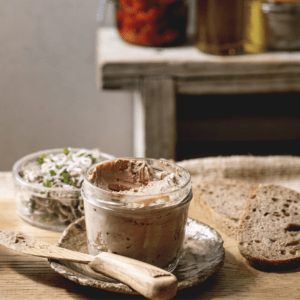Foie gras is embroiled in never-ending controversy. Animal rights supporters decry the force-feeding required to produce fatty goose or duck liver. Chefs defend foie as inextricable from fine dining. And foodies crave that silken, indulgent texture and savory depth pairing beautifully with wine or crusty bread. What if you could satisfy all parties? This is why faux gras deserves attention as the ethical epicurean option.
Faux gras utilizes plants like lentils, nuts and mushrooms to mimic the extravagant mouthfeel and rich flavour of foie without the ethical baggage. Blending umami-boosting ingredients like miso and truffle achieves unbelievable richness and nuance rivaling animal sources. Properly prepared faux gras slides over the tongue with opulent weight and savoury satisfaction. You forget completely that the lush sensation comes from humble lentils and fungi. Paired with crisp toast points and Sauternes, the experience transports you to a romantic French countryside escape…no force-feeding required.
Beyond competitive taste, faux gras wins on environment, health and transparency. With climate concerns escalating, the plant-based alternative generates far less emissions and waste than industrial foie production. Faux gras also eliminates cholesterol and high saturated fats that rich liver patés contain. And passionate chefs crafting gourmet faux specialties typically emphasize ethics and sustainable sourcing. This transparency around ingredients and methods enables more informed, values-aligned dining choices.
While some scoff that nothing can truly replace buttery foie, skepticism often vanishes once those first silken notes coat the palate. In my experience, faux gras frequently fools even the most discerning gourmands in blind taste tests. Preconceptions shattered, tasters realize plant potentials. And exciting new posibilities open up.
Freed from controversy and constraints, faux gras fuels creativity both conceptually and culinarily. Chefs craft unique flavor profiles fusing global ingredients like gochujang, harissa and lemongrass. Food scientists perfect the chemistry behind luscious, meaty textures. Techniques like sous vide eggplant achieve unprecedented elegance. Such innovations attract interest from leading restaurants like Eleven Madison Park shifting towards sustainable luxury.
The key draws of traditional foie – indulgence, artistry, hedonism – all thrive in the plant-based category. Perhaps foie traditionalists compare faux to the grainy health foods of old, but modern renditions play in an entirely different league. In truth, I’ll still enjoy foie itself on occasion knowing the impacts. But to meet escalating ethical and environmental priorities, faux gras is the conscientious way forward that sacrifices none of the decadence. That gives me hope for the future of responsible yet exquisite dining.
So whether for ethics, taste or novelty, I urge any lover of fine cuisine to explore faux gras possibilities. The false promises of old no longer apply to these new compassionate creations. We enter an age where technological advances permit sustainable luxury previously unimaginable. Anyone can now experience princely extravagance born of bean and mushroom essence rivaling fatted bird livers of yore. Through responsible innovation, the once unthinkable becomes reality. And so progresses the inevitable rise of faux gras as righteous delicacy.
Decadent Faux Gras
Equipment
- 1 terrine mold
Ingredients
- 1 cup raw cashews soaked overnight
- 1 cup lentils cooked
- 1 medium shallot chopped
- 2 cloves garlic
- 2 tbsp. nutritional yeast
- 1 tbsp. white miso paste
- 1 tbsp. tamari
- 1 tsp. fresh thyme
- 1/2 oz dried porcini mushrooms reconstituted
- 1 tbsp. truffle oil or to taste
- 1/4 cup olive oil plus more for sautéing
- 2 tsp. Cognac
- 1/2 tsp. freshly ground black pepper
- 1 pinch sea salt to taste
Instructions
- Drain cashews from soaking liquid. Add to a food processor along with lentils, shallot, garlic, mushrooms, and spices. Purée until very smooth, scraping down sides as needed.
- Heat 1 tbsp olive oil in a skillet over medium heat. Sauté shallot and garlic for 1-2 minutes until fragrant and translucent.
- Fold sautéed mixture along with all remaining ingredients into food processor. Continue blending, drizzling in more olive oil gradually, until desired faux gras texture and taste is reached.
- Line a terrine mold or small loaf pan with plastic wrap. Pack faux gras mixture tightly into the mold, folding over the plastic wrap to completely seal it. Refrigerate overnight before slicing and serving. Top with black truffle shavings if desired.
- Spread onto crackers or crostini, or use faux gras chunks within salads or stuffed into figs or dates for an incredible vegan pâté hors d'oeuvre. Enjoy!


